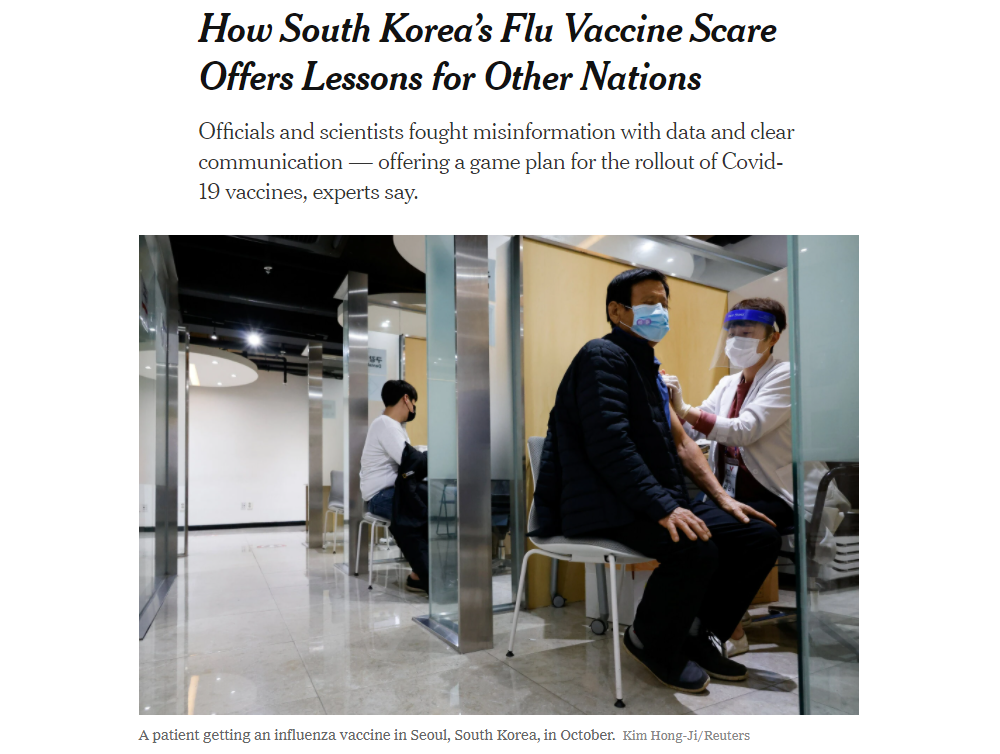-
 Korea.net's 24-hour YouTube channel
Korea.net's 24-hour YouTube channel- NEWS FOCUS
- ABOUT KOREA
- EVENTS
- RESOURCES
- GOVERNMENT
- ABOUT US

The New York Times, in the Nov. 24 article titled "How South Korea’s Flu Vaccine Scare Offers Lessons for Other Nations," said the Korean government and scientists alleviated public fears over deaths that occurred after people received flu vaccinations through the presentation of clear data and communication. (Screen capture from New York Times)
By Kim Hyelin and Lee Jihae
The New York Times has hailed the Korean government for alleviating public fears over seasonal flu vaccines through communication and setting a game plan for COVID-19 inoculations.
In the Nov. 24 article titled "How South Korea's Flu Vaccine Scare Offers Lessons for Other Nations," the daily said public fears over vaccines arose after people died after getting flu shots, while Seoul expanded a flu vaccine program to prevent a simultaneous surge of COVID-19 and seasonal flu.
"South Korean scientists quickly determined that the deaths were unrelated to the flu shots. But they worried that if they didn’t stop the panic, the public might shun the vaccines altogether," The Times said, adding that the government communicated with the public using scientific data and "quickly got the vaccination campaign back on track."
Noel T. Brewer, a professor of health behavior at the Gillings School of Global Public Health of the University of North Carolina, was quoted as saying, "South Korea is doing everything right," adding, "The government is gathering data, giving information to the public quickly and standing up for their vaccination program. That will ensure public trust, and help the program."
He thus called Korea's response an "example of how to respond to vaccine scares in the future."
Dr. Jeong Eun-Kyeong, commissioner of the Korea Disease Control and Prevention Agency, said that while 1,500 people ages 65 or older died within a week after getting flu shots, vaccines had nothing to do with their deaths.
Dr. Vanessa Raabe, an assistant professor of infectious disease allergy, immunology and pediatric infectious disease at New York University, was quoted as praising Korea's response.
"If you just blindly say, 'oh no, these are not related,' you’ll build a lot of distrust," she said. "You need to do the science before you say they are not related."
Commissioner Jeong, who has led Korea's response to the COVID-19 pandemic, was named to the BBC list of this year's top 100 women.
"As the current commissioner of the Korea Disease Control and Prevention Agency (KDCA) – and having previously served as its first female chief – she is known for her transparency and the calm she brings to her daily briefings on the pandemic," the British public broadcaster said.
kimhyelin211@korea.kr
Most popular
- First hearing-impaired K-pop act hopes for 'barrier-free world'
- Expats could account for 7% of population in 20 years: report
- 'Mad Max' director impressed by 'cinema-literate' Korean viewers
- Show in Italy to present 'thought-filled' Korean craftworks
- Romanian presidential couple visits national cemetery













